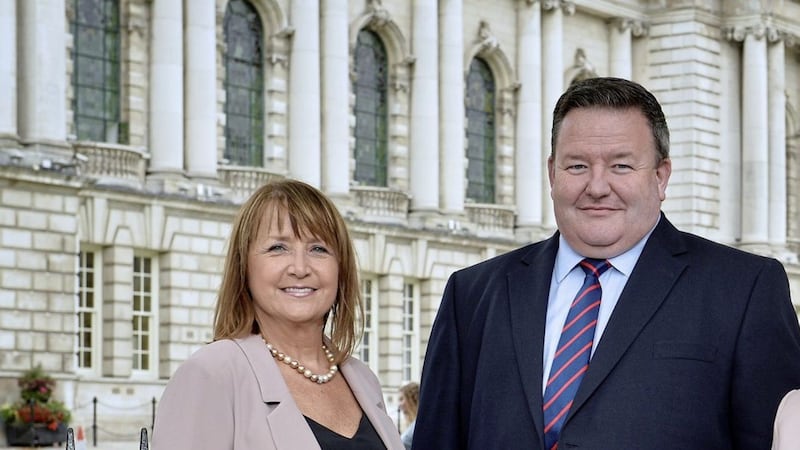TWO in five small businesses in Northern Ireland have either completely run out of cash - or the taps will have run dry within the next four weeks.
And for those who have fallen through the cracks of eligibility for the various government grant schemes, they fear accessing a loan is no longer an option - because they simply won't be able to repay it.
But those firms which have had to furlough staff (85 per cent have furloughed some or all staff to date), the majority say they have found the claim process straightforward.
The findings are contained in the latest bellwether of sentiment in a survey by the NI Chamber of Commerce and business advisers BDO.
It gathered its data over three consecutive days last week, and its sample was around 150 member businesses.
It found that three in five businesses revealed a significant fall in income as a result of the pandemic, with most claiming they'll run out of money imminently.
It also reveals that almost three quarters of businesses have used the online Job Retention Scheme portal with the majority (74 per cent) finding the furlough claim process straightforward.
Some 25 per cent have also applied for the Coronavirus Business Interruption Loan Scheme (CBILS), with one in 10 of them having received their money by last Friday.
Chamber chief executive Ann McGregor said: “It's evident many business owners are facing an acute cash flow crisis, as well as fears about the long-term impact of the lockdown.
“We welcome how the government has listened to the concerns of business to date and is taking steps to get cash to the front line where it is needed. But much of this has increased business debt and will hinder recovery unless there are more grant based systems."
She described the furlough scheme as "extremely helpful" for businesses, but insisted it needs to run beyond its scheduled June 30 conclusion to help businesses transition toward a new normal as the lockdown is eased.
BDO's managing partner Brian Murphy added: “The continued erosion in revenue for so many businesses is sadly not unexpected and will have long-lasting consequences for their future.
“This pandemic has hit the business community hard, with hospitality all but closed and manufacturing and services struggling to maintain operations and employment.
“But while people's health must always be the number one priority, it's crucial that businesses are given every opportunity to come back fighting. Proactive planning and continued support are vital if companies are to have any chance of rebuilding their revenue streams."
Among the key findings of the survey are:
:: Business performance and cash flow
- Most businesses have suffered a hit in revenue with 75 per cent of firms seeing income fall in just 6 weeks.
- For 3 in 5 businesses the fall in revenues has been significant.
- Very few firms are seeing revenues rise during the crisis. In fact for every 1 firm that is seeing domestic revenue rise there are 14 that are seeing revenue fall.
::Cash Reserves
- 3 in 4 businesses have taken a hit on cash reserves – for 50 per cent cash reserves have fallen significantly.
- In fact, 2 in 5 respondents to the survey have either no or less than 1 months cash reserves left.
- Two-thirds, 66 per cent, have less than 3 months cash reserves suggesting little money in many businesses to meet the emergency situation many currently face.
- Just 12 per cent have more than 6 months cash reserves. Just 2 per cent have more than 12 months cash reserves.
::Workforce and Jobs
- The most significant impact on jobs to date has been a reduction in hours worked by staff (61 per cent).
- 2 in 5 businesses have seen a reduction in staff numbers.
- 43 per cent have seen a reduction in use of contract/agency workers.
- Only 5 per cent have seen hours worked increase.
:: Uptake and experience of the Job Retention (Furlough) Scheme
- 85 per cent of businesses have furloughed some or all of their staff.
- 24 per cent (1 in 4) have furloughed all of their staff.
- Most businesses have used the online portal to make a claim - 74 per cent have made/attempted to make a claim while 25 per cent have yet to but do plan to.
- Of those who have made a claim, the majority (74 per cent) have found the process straightforward and the claim was submitted with ease.
- 21 per cent found it difficult to submit a claim.
- 6 per cent attempted but were unable to access the portal.
:: Covid-19 Business Interruption Loan Scheme (CBILS)
- One quarter of respondents have tried to access CBILS – securing overdrafts, term loans and asset finance largely used to finance every day operations and pay debt.
- Just 10 per cent of those business that have applied to CBILS have received payment. Some businesses say that they will have to scale back operations as a result.
- A further 20 per cent plan to access the scheme.
- Around half of businesses (47 per cent) have no plans to apply to CBILS – the main reasons being that they have enough cash for now or want to wait to see what happens with the lock down.
- 25 per cent of those that have no plans to apply for CBILS said that they couldn’t afford to repay the loan.
:: Awareness and uptake of other business support schemes
- Deferral of VAT payments (41 per cent) and the Business Rates Holiday (35 per cent) have had the greatest uptake to date of other measures of support.
- 21 per cent have accessed grant support offered through the £10k cash grant scheme.
- However, around 1 in 5 businesses (19 per cent) have tried to claim the cash grant but were unsuccessful. The main reason is that they did not meet the criteria.
- The least well known schemes include the Statutory Sick Pay Refund and HMRC Time to Pay scheme.







